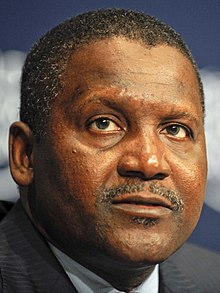Social class in Nigeria



The social structure in Nigeria is the hierarchical characterization of
Since independence, however, it has become increasingly characterized by the gradual shift towards wealth, income, education, type of occupation, and most recently specific subcultures amongst the youth.
Classification
Some social critics have adopted the Marxist view of class in which individuals are classified by their relationship to the means of production, and are thus members of either the middle class, or bourgeoisie, or the working and underclasses, or proletariat. This is regarded by such people as the most important factor in a person's social rank. The middle class, or bourgeoisie, traditionally occupies an intermediate position in the Nigerian class hierarchy. In the past two centuries it has risen in power, however, aided by modernization and Westernization respectively. The working and underclasses, or proletariat, collectively make up the greater proportion of the country's population. There is considerable overlap between these two latter classes, as individuals tend to move from one to the other as their situations change over time.
History
Pre-colonial Nigeria
The traditional
Although the holders of this and other titles would therefore belong more to the Nigerian chieftaincy system than they would to a distinct upper middle class, their existence in the pre-colonial period nevertheless set the scene for the subsequent development of one. Some bourgeois members of later generations, such as Chief
Old methods of stratification prevailed during this era. In addition to the chiefs, Nigerian society was composed of both free and enslaved individuals that were ranked beneath them. Social mobility was largely static, though rising through the ranks (from slave to free person, and from free person to chief) was technically possible in many tribes for much of the country's pre-colonial history.
Colonial Nigeria

Following the
Outside of this community in particular, other people also engaged in trade on a large scale and joined it in becoming members of what was rapidly coalescing into a colonial nouveau riche class distinct from the traditional ruling chieftaincy. Notable amongst them were Alhaji
Many members of both the chieftaincy and the free class were also assimilated at this time into this new bourgeoisie after themselves being educated along Western lines. As a result, a new dichotomy was created - between all those that had been so educated and the mass of Nigerians that had not. Bourgeois individuals such as the Saro, the Amaro, and the educated natives were
Independent Nigeria
At Independence in 1960, members of what was by then the Nigerian upper middle class were represented amongst the new leadership that inherited power. For example, Chief Funmilayo Ransome-Kuti (the daughter of a Saro chief that had once traded palm produce) was a member of the Western Region's House of Chiefs.[7]
In the decades since, the class system has expanded further. The middle class' links to the political elite have been strengthened, and advantageous policy changes on the part of the politicians have led to the generation of large amounts of wealth. Notable contemporary members of the Nigerian bourgeoisie include billionaires Chief

Many members of the current proletariat have historic ties of descent to either the chieftaincy or the bourgeoisie, and therefore belong to families that can be said to have lost caste in the intervening decades due to a variety of factors. Although upward social mobility has become more prevalent in independent Nigeria in theory, corruption, nepotism and cronyism have kept many people out of the upper and middle classes in a continuous cycle of deprivation despite the growth in the country's national wealth.[9]
Criticism
Conspicuous consumption amongst the ruling classes
Much like the ruling classes of other countries, the Nigerian upper and middle strata have continued to live in a way that most Nigerians can only imagine; their members have thrown lavish wedding parties, imported their food from abroad,
... The true position of Nigerian women had to be judged by the women who carried babies on their backs and farmed from sunrise to sunset... Not women who used tea, sugar, and flour for breakfast.
See also
References
- ^ "In pictures: Country of kings, Nigeria's many monarchs". BBC News. 2013-10-13. Retrieved 2021-07-01.
- ^ Sudarkasa, Niara (1973), Where Women Work: A Study of Yoruba Women in the Marketplace and the Home, p. 57.
- ^ Cunha Carneiro da, Marianno; Verger, Pierre (1985). Da senzala ao sobrado: arquitetura brasileira na Nigéria e na República Popular do Benim = From slave quarters to town houses : Brazilian architecture in Nigeria and the People's Republic of Benin. São Paulo: SP: Nobel. p. 34.
- ^ "Meet the wealthy but simple Nigerian merchant behind Dangote's success". Face2FaceAfrica.com. 7 August 2019. Retrieved January 14, 2021.
- ^ Robert, Sklar (1963). Nigerian Political Parties: Power in an Emergent African Nation. Princeton: Princeton University Press. p. 180.
- ^ Mann, K. (1981). Marriage Choices among the Educated African Elite in Lagos Colony, 1880-1915. The International Journal of African Historical Studies, 14(2), 201–228. https://doi.org/10.2307/218043
- )
- ^ "Dangote, Adenuga, Alakija rank among richest Blacks". Punchng.com. Retrieved January 14, 2021.
- ^ "Poverty in Nigeria rises to 61%". bbc.com. Retrieved November 22, 2022.
- ^ "Crazy Rich Nigerians". Africasacountry.com. Retrieved January 18, 2021.
- ^ "The Nigerians have arrived..." Tatler.com. 24 November 2014. Retrieved June 27, 2021.
- ^ Mayer, Adam (2016), "Olufunmilayo Ransome-Kuti", Naija Marxisms: Revolutionary Thought in Nigeria, Pluto Press, pp. 172-176.
